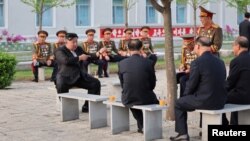The Biden administration’s apparent willingness to engage North Korea is causing a rare public rift with one of Washington’s key allies in Asia over how to achieve Pyongyang’s denuclearization.
Last week, the two allies, on separate occasions, showed differences about whether to consider “interim steps” toward North Korea’s complete denuclearization.
South Korean national security adviser Chang Ho-jin said, “U.S. senior officials confirmed several times that there are no such thing as interim steps” toward denuclearization. He made the remarks in an interview with South Korean media outlet KBS, aired on April 27.
A U.S. National Security Council spokesperson confirmed in an email to VOA’s Korean Service on April 30 that “by saying that the United States is willing to consider interim steps, we are making clear that we recognize that building trust with the DPRK and making progress toward denuclearization will take time.”
The Democratic People’s Republic of Korea (DPRK) is North Korea’s official name.
In response to the NSC spokesperson’s comments, a South Korean Foreign Ministry spokesperson told VOA Korean on May 1 that Chang’s remarks “reaffirm that the U.S. will not put aside complete denuclearization while it settles for a stopgap measure limiting [negotiations] to a nuclear freeze in return for sanctions relief.”
Taking interim steps toward denuclearization involves reciprocal concessions or corresponding measures that both sides are willing to make to reach that goal.
Interim steps toward denuclearization are not a new approach. The approach was tried and failed by the former Clinton and George W. Bush administrations when North Korea was engaged in negotiations with the U.S.
In March of this year, senior U.S. officials expressed Washington’s interest in considering “interim steps” amid talks that remained stalled with Pyongyang since October 2019.
A State Department spokesperson told VOA Korean in April that it made multiple attempts to communicate with North Korean officials, but that Pyongyang has not shown interest in engaging.
Experts said Seoul is concerned that Washington’s mention of interim steps and measures that could be included in those steps, especially threat reduction, could hinder Pyongyang from making a commitment toward complete denuclearization in future negotiations.
Andrew Yeo, the SK-Korea Foundation chair in Korea Studies at Brookings Institution’s Center for Asia Policy Studies, said, “Seoul prefers not to engage in any diplomatic negotiations without a DPRK commitment to denuclearization and wants to appear resolute.”
“Washington has signaled to North Korea that it’s willing to be more flexible when it comes to restarting diplomatic engagement with North Korea. Seoul may not want to give the appearance of that flexibility so is perhaps denying any legitimacy behind an ‘interim steps’ approach,” he added.
Seoul has taken a tough stance on North Korea under President Yoon Suk Yeol since he took office two years ago by focusing on deterrence and alignment with Washington and U.S.-led trilateral security cooperation with Japan.
Evans Revere, a State Department official with extensive experience negotiating with North Korea, said some critics and officials in Seoul and Tokyo are worried that the U.S. will focus on other goals Washington mentioned such as confidence building and tension reduction rather than on denuclearization.
“There is also concern that Washington may be prepared to engage in arms control talks with Pyongyang — a move that would generate deep concern among U.S. allies, in large part because it would effectively accept North Korea’s nuclear arsenal as permanent,” he said.
Talks over arms control or “nuclear freeze” that Seoul said it is concerned about or “threat reduction” or “risk reduction” mentioned by U.S. officials in March — which could be included in the interim steps — are considered equivalent to accepting North Korea as a nuclear state and opposed by some officials and analysts.
At an event held by the Center for Strategic and International Studies (CSIS) on March 3, Mira Rapp-Hooper, senior director for East Asia and Oceania at the National Security Council, said the U.S. will discuss threat reduction with North Korea as it considers interim steps on the "pathway to denuclearization."
Also at an event by CSIS on March 18, Jung Pak, a U.S. senior official for North Korea, said Washington wants North Korea to take risk reduction steps and discuss sanctions and confidence-building measures.
Victor Cha, senior vice president for Asia and Korea chair at CSIS, however, said that Rapp-Hooper's reference to "the formulation of interim measures to reduce the threat on the peninsula" in March "reflects the same pragmatic view that any negotiation has to start at step 1 — whether you call that interim measures or initial denuclearization."
"As a former negotiator, I can say that any pragmatic implementation of denuclearization would have to include such steps, which I do not think would represent de facto acceptance of DPRK nuclear status — that is neither Washington, nor Seoul's policy," he said.
Cha formerly served as deputy head of delegation for the U.S. at six-party denuclearization talks.













